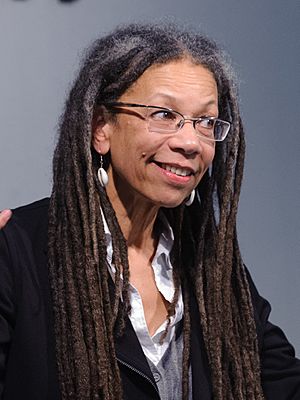Ruth Wilson Gilmore facts for kids
Quick facts for kids
Ruth Wilson Gilmore
|
|
|---|---|

Gilmore in 2012
|
|
| Born | April 2, 1950 New Haven, Connecticut, U.S.
|
| Education | Rutgers University, New Brunswick (PhD) |
| Occupation | Scholar, Professor |
| Scientific career | |
| Institutions | CUNY Graduate Center, University of Southern California |
| Thesis | From Military Keynesianism to Post-Keynesian Militarism: Finance Capital, Land, Labor, and Opposition in the Rising California Prison State (1998) |
| Doctoral advisor | Neil Smith |
Ruth Wilson Gilmore (born April 2, 1950) is a well-known scholar and professor. She is famous for her work on how prisons and society are connected. She teaches geography at the Graduate Center of the City University of New York.
Professor Gilmore is known for creating a field of study called "carceral geography." This field looks at how prisons, places, and the economy are all linked together. In 2020, she received a special Lifetime Achievement Award from the American Association of Geographers for her important work.
Contents
Early Life and Education
Ruth Wilson Gilmore was born on April 2, 1950, in New Haven, Connecticut. Her family had a history of being involved in making positive changes in their community.
Family Background
Gilmore's grandfather helped start the first union for workers at Yale University. A union is a group of workers who join together to improve their jobs and pay. Her father, Courtland Seymour Wilson, worked with tools and machines at a company called Winchester Repeating Arms. He was also active in his workers' union. Later, he worked at Yale Medical School and Yale-New Haven Hospital, helping with community relations.
School Days
In 1960, Ruth attended a private school in New Haven. She was one of the few students from a working-class family and was often the only African American student there.
In 1968, she started college at Swarthmore College in Pennsylvania. There, she became involved in student activism, which means working to bring about social or political change. In 1969, Gilmore and other students protested at the school's admissions office. They wanted the college to accept more Black students.
After some difficult events, Gilmore left Swarthmore and went back home. She then enrolled at Yale, where she earned a bachelor's degree in drama.
Career and Research
Ruth Wilson Gilmore earned her PhD in 1998 from Rutgers University. Her studies focused on how economies work and how societies are organized.
Developing Carceral Geography
After getting her PhD, she became a professor at the University of California, Berkeley. This is where she started developing her idea of "carceral geography." This field of study explores how land, natural resources, money, and buildings are connected to how people are policed, jailed, and controlled.
Many scholars who study this area are part of the Carceral Geography Working Group in the UK. Professor Gilmore gave an important speech at a conference for Carceral Geography in 2017.
Working for Social Justice
Professor Gilmore has helped start many groups that work for social justice. These groups aim to make society fairer for everyone.
- In 1998, she helped create Critical Resistance, an organization that works to reduce the number of people in prisons.
- In 2003, she co-founded Californians United for a Responsible Budget (CURB). This group works to stop the building of more jails and prisons. She is still on their board today.
Published Works
Gilmore is a leading expert and speaker on many topics, including prisons, reducing the number of people in jail, and how race and money are connected. She wrote a book called Golden Gulag. This book won an award in 2008 for being the best first book in American Studies. She has also written articles for various academic journals and books.
Awards and Recognition
Professor Gilmore has received many awards for her important work and ideas.
- In 2011, she was a main speaker at the National Women's Studies Association conference.
- In 2012, she received the Angela Y. Davis prize for Public Scholarship. This award recognizes scholars who use their knowledge to help the public, influence policies, or address unfairness in creative ways.
- In 2014, she received the Harold M. Rose Award for Anti-Racism Research and Practice.
- In 2017, she earned the Richard A. Yarborough Award, which honors teachers who are excellent at teaching and guiding students.
- In 2020, Prospect magazine listed her as one of the greatest thinkers of the time. They noted that her ideas have helped change how people think about crime, moving from just punishment to helping people improve.
- In 2021, Gilmore was chosen as a Member of the American Academy of Arts and Sciences, a very respected group of scholars.
- In 2023, an artist named Jess X. Snow and local community members painted a mural in New Haven, Connecticut, to honor Professor Gilmore.
See also
 In Spanish: Ruth Wilson Gilmore para niños
In Spanish: Ruth Wilson Gilmore para niños

